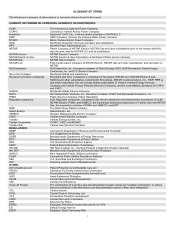Eversource 2012 Annual Report Download - page 20
Download and view the complete annual report
Please find page 20 of the 2012 Eversource annual report below. You can navigate through the pages in the report by either clicking on the pages listed below, or by using the keyword search tool below to find specific information within the annual report.7
The Cape Light Compact, an inter-governmental organization consisting of the 21 towns and two counties on Cape Cod and Martha’s
Vineyard, serves 200,000 customers through the delivery of energy efficiency programs, effective consumer advocacy, competitive
electricity supply and green power options. NSTAR Electric continues to provide electric service to these customers including the
delivery of power, meter reading, billing, and customer service.
NSTAR Electric continues to supply approximately 40 percent of its customer load at basic service rates while the other 60 percent of
its customer load has migrated to competitive energy suppliers. WMECO continues to supply approximately 49 percent of its customer
load at basic service rates while the other 51 percent of its customer load has migrated to competitive energy suppliers. Because
customer migration is limited to energy supply service, it has no impact on the delivery business or operating income of NSTAR and
WMECO.
The distribution rates established by the DPU for NSTAR Electric and WMECO are comprised of the following:
A distribution charge, which includes a fixed customer charge and a demand and/or energy charge to collect the costs of
building and expanding the infrastructure to deliver power to its destination, as well as ongoing operating costs. The
distribution charge also includes the recovery, on a fully reconciling basis, of certain DPU-approved safety and reliability
program costs, a Pension and PBOP Rate Adjustment Mechanism (PAM) to recover incremental pension and PBOP benefit
costs, a reconciling rate adjustment mechanism to recover costs associated with the residential assistance adjustment clause,
a net-metering reconciliation surcharge to collect the lost revenues and credits associated with net-metering facilities installed
by customers, and an Energy Efficiency Reconciling Factor (EERF) to recover energy efficiency program costs and lost base
revenues in addition to those charges recovered in the energy conservation charge.
A basic service charge represents the collection of energy costs, including costs related to charge-offs of uncollected energy
costs, through DPU-approved rate mechanisms. Electric distribution companies in Massachusetts are required to obtain and
resell power to retail customers through basic service for those who choose not to buy energy from a competitive energy
supplier. Basic service rates are reset every six months (every three months for large commercial and industrial customers).
The price of basic service is intended to reflect the average competitive market price for electric power. Additionally, the DPU
has authorized NSTAR Electric to recover the cost of its Dynamic Pricing Smart Grid Pilot Program through the basic service
charge.
A transition charge represents costs to be collected primarily from previously held investments in generating plants, costs
related to existing above-market power contracts, and contract costs related to long-term power contracts buy-outs.
A transmission charge to recover the costs of transporting electricity over high voltage lines from generating plants to
substations, including costs allocated by ISO-NE to maintain the wholesale electric market.
An energy conservation charge represents a legislatively-mandated charge to collect costs for energy efficiency programs.
A renewable energy charge represents a legislatively-mandated charge to collect the costs to support the development and
promotion of renewable energy projects.
Rate Settlement Agreement
On February 15, 2012, NU and NSTAR reached comprehensive settlement agreements with the Massachusetts Attorney General
(Attorney General settlement agreement) and the DOER related to the Merger. The Attorney General settlement agreement covered a
variety of rate-making and rate design issues, including a base distribution rate freeze through 2015 for NSTAR Electric and WMECO, a
rate credit of $15 million to customers of NSTAR Electric and a rate credit of $3 million to customers of WMECO. The settlement
agreement reached with the DOER covered the same rate-making and rate design issues as the Attorney General's settlement
agreement, as well as a variety of matters impacting the advancement of Massachusetts clean energy policy established by the Green
Communities Act and Global Warming Solutions Act. On April 4, 2012, the DPU approved the settlement agreements and the Merger.
NSTAR Electric is operating under a DPU-approved Rate Settlement Agreement (Rate Settlement Agreement) that was scheduled to
expire on December 31, 2012. As noted above, the rates under the Rate Settlement Agreement are subject to a base distribution rate
freeze through 2015 pursuant to the Attorney General settlement agreement. Pursuant to a 2008 DPU order, Massachusetts electric
utilities must adopt rate structures that decouple the volume of energy sales from the utility’s revenues in their next rate case. The
exact timing of NSTAR Electric’s next rate case has not yet been determined, but it will not be before 2015.
In WMECO’s January 31, 2011 rate decision, the DPU approved a revenue decoupling reconciliation mechanism that provides
assurance that WMECO will recover a DPU pre-established level of baseline distribution delivery service revenue to manage all other
distribution operating expenses and earn a level of return on its capital investment. The rates under the January 31, 2011 rate decision
are subject to a base distribution rate freeze through 2015 pursuant to the Attorney General settlement agreement .
NSTAR Electric and WMECO are each subject to service quality (SQ) metrics that measure safety, reliability and customer service, and
must pay to customers any charges incurred for failure to meet such metrics. Neither NSTAR Electric nor WMECO will be required to
pay an assessment charge for its 2012 performance results as both companies performed at or above target for all of their respective
SQ metrics in 2012.
























